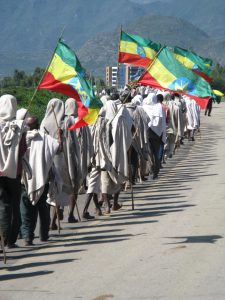
This week, the National Electoral Board of Ethiopia (NEBE) announced the new proposed date of August 18th for the parliamentary and local council elections. The election in August would be the first under Prime Minister Abiy Ahmed, who recently won a Nobel Peace Prize for his peace negotiations with Eritrea and has softened political restrictions across the country. The ruling party of Ethiopian People’s Revolutionary Democratic Front (EPRDF), who has dominated Ethiopian politics for nearly 30 years, appointed Abiy after a period of anti-establishment and government protests (Endeshaw 2020).
Entering the role of prime minister in 2018, Abiy recently transformed the EPRDF into the Prosperity Party, merging three of the four major ethnic based parties, along with other groups. In other attempts to promote democracy in the country, he has decreased attacks on the media and activists, removed political parties from terrorist lists, and promoted former dissidents to posts within government (Endeshaw 2020). While Abiy has clearly attempted reforms to an unlevel playing field, the upcoming elections will identify whether the country still experiences authoritarian influences in their democratic systems and if they can hold free and fair elections.
In a move of bipartisan support, Abiy appointed Birtukan Mideksa, a former opposition leader who spent time in jail after the 2005 disputed elections, to lead the NEBE. She has returned to Ethiopia after spending seven years in exile in the United States (BBC News 2018). In her role, she announced the plans to vote for parliament and regional councils in May would be ‘postponed as neither authorities nor parties would be ready’ (Endeshaw 2020). However, recently, attacks on opposition have continued despite attempts to correct repressive behavior. The electoral agency targeted Jawar Mohammed, a member of the Oromo Federalist Congress, asking about his citizenship status (Gebre 2020). This move might signal the intention of the ruling party to return to oppressive tactics if they feel threatened by rising candidates and opposition movements.
Ethiopia has held democratic elections since 1991 (Endeshaw 2020). The electoral system is a first-past-the-post parliamentary system, where the prime minister is selected by the party who gains the most votes in government (Reynolds 2005). Elections occur every five years (Tadesse 2020). While Ethiopia has claimed to possess democratic institutions, not many of their elections have been competitive and the last parliamentary elections in 2015 ‘were not held up to democratic standards.’ In the most recent election, the EPRDF won all 547 seats in Parliament, leaving no voice to the opposition in Parliament. Independent election agencies, such as the Freedom House, address reports of voter coercion, intimidation, and administrative barriers, in past elections in Ethiopia (“Ethiopia” 2020). The dominance of the EPRDF, the party that placed Abiy in power, reflects the popular trend in democratization where the parties or leaders who led the process of democratization often are able to consolidate power and remain in control for decades. The African National Congress in South Africa is a prime example of this pattern.
The exception to this norm were the parliamentary elections in 2005 when Ethiopian Citizens for Social Justice Party (EZEMA) won in a landslide. However, the outcome of the election led to multiple days of bloody insurrections across the country (Tadesse 2020). This fear of violence has been resuscitated in the lead up to the 2020 parliamentary elections. Certain opposition leaders have discounted the ability of the Abiy administration and the current Ethiopian government to hold credible and secure elections.
Despite reforms, Ethiopia still possesses many deep ethnic rivalries. Ethnic violence has continued as an issue for the stability of the country. Violence continues to plague many regions, especially the Oromo where clashes forced 2.4 million people out of their homes, delaying the census (Endeshaw 2020). The acts of violence note a level of instability in the country and might point at opportunities for Abiy and the Prosperity Party to limit the freeness of the upcoming elections.
Other opposition groups have expressed concerns for the date for other reasons. Dawud Ibsa, leader of the Oromo Liberation Front (OLF), explained his disapproval of the late August date. He maintained that “August is rainy season when rivers will bulge, making it difficult for people for the countryside to move about,” suggesting instead an earlier date in June. EZEMA, another opposition group, agreed with the OLF statement (Tadesse 2020). Others responded that the date was unsuitable because it was a fasting day for the Ethiopian Orthodox Church (Endeshaw 2020).
Overall, the upcoming Ethiopian elections will determine whether the recent democratic reforms improved the status of democracy in the country or whether the government will succumb to its authoritarian precedents. The change in date has pointed at early discrepancy and drama creeping into the system, but only time will tell if Abiy will be able to successfully accomplish his apparent goal of improving democracy. The elections also point at a larger question in the field of democracy and elections. Can a single political figure dramatically reform the democratic system of a country? If Abiy is successful in carrying out a free and fair election, will violence persist? And finally, if democracy prevails, will it vanish once Abiy is out of power?
Works Cited
Endeshaw, Dawit. “Ethiopia Sets Tentative August Date for Elections.” Reuters, Thomson Reuters, 15 Jan. 2020, www.reuters.com/article/us-ethiopia-election/ethiopia-sets-tentative-august-date-for-elections-idUSKBN1ZE0R3.
“Ethiopia.” Ethiopia Country Report, Freedom House, 3 Feb. 2020, freedomhouse.org/report/freedom-world/2019/ethiopia.
“Ethiopian’s Birtukan Mideksa Appointed Election Boss.” BBC News, BBC, 22 Nov. 2018, www.bbc.com/news/world-africa-46301112.
Gebre, Samuel. “Ethiopia Vote Agency Queries Key Opposition Leader’s Citizenship.” Bloomberg.com, Bloomberg, 12 Feb. 2020, www.bloomberg.com/news/articles/2020-02-12/ethiopia-vote-agency-queries-key-opposition-leader-s-citizenship.
Reynolds, Andrew, et al. Electoral System Design: the New International IDEA Book. International IDEA, 2005.
Tadesse, Addis Getachew. “Can Ethiopia Hold a Credible 2020 Election?” Anadolu Agency, 18 Jan. 2020, www.aa.com.tr/en/africa/can-ethiopia-hold-a-credible-2020-election/1706434.
